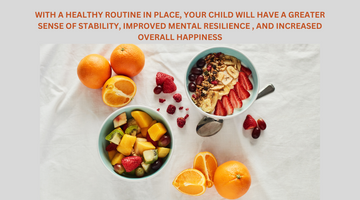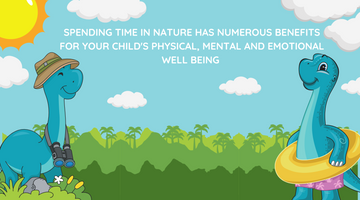Establishing a healthy routine is crucial for a child's mental health and overall well-being. A well-structured routine provides stability, promotes positive habits, and helps children develop important life skills. Let's discuss the key strategies, practical tips, and the benefits that come with maintaining a consistent schedule.
- Consistency and Structure :
Consistency is the cornerstone of a healthy routine. Establish regular wake-up and bedtime routines, meal times, and study schedules. Consistent routines provide children with a sense of stability and predictability, reducing anxiety and promoting a feeling of safety. Structure helps children know what to expect, which can alleviate stress and improve their overall mental well-being.
2. Prioritise Sleep :
Adequate sleep is essential for a child's mental health. Establish a consistent sleep schedule, ensuring your child gets the recommended amount of sleep for their age. Create a calming bedtime routine that promotes relaxation, such as reading a book or taking a warm bath. Sufficient sleep improves mood, concentration, and cognitive function, while also reducing the risk of mental health issues.
3. Balanced Nutrition :
A healthy routine includes a balanced diet. Provide nutritious meals and snacks at regular intervals throughout the day. Encourage your child to eat a variety of fruits, vegetables, whole grains, and lean proteins. Proper nutrition supports brain development, enhances mood stability, and improves overall energy levels. Avoid excessive sugary and processed foods, as they can negatively impact mental well-being.
4. Physical Activity :
Incorporate regular physical activity into your child's routine. Engage in activities they enjoy, such as biking, swimming, or playing team sports. Exercise releases endorphins, which promote a positive mood and reduce stress and anxiety. Physical activity also improves sleep quality, cognitive function, and self-esteem. Encourage your child to be active for at least one hour every day.
Read more at : Mindfulness and Self-Care for Kids
5. Time for Hobbies and Creative Outlets :
Include time for hobbies and creative outlets in your child's routine. Encourage activities such as drawing, painting, playing a musical instrument, or participating in sports. Engaging in activities they enjoy fosters a sense of accomplishment, boosts self-esteem, and provides an outlet for self-expression. Hobbies also promote relaxation and stress relief, enhancing mental well-being.
6. Limit Screen Time :
Set reasonable limits on screen time and ensure that it is balanced with other activities. Excessive screen time has been linked to various mental health issues. Encourage your child to engage in activities that promote social interaction, physical activity, and creativity instead of spending excessive time in front of screens. Create screen-free zones and dedicated family time to foster connection and communication.
7. Teach Stress Management Techniques :
Include stress management techniques in your child's routine. Teach them deep breathing exercises, mindfulness, and relaxation techniques. Encourage them to take breaks when feeling overwhelmed and provide them with healthy coping strategies. By learning to manage stress, children can develop resilience and prevent the negative impacts of chronic stress on their mental health.
Building a healthy routine is a powerful tool for supporting your child's mental health. By establishing consistency, prioritising sleep and nutrition, promoting physical activity and hobbies, limiting screen time, and teaching stress management techniques, you are creating a foundation for their overall well-being. Remember that every child is unique, so adapt the routine to their specific needs and interests. With a healthy routine in place, your child will have a greater sense of stability, improved mental resilience, and increased overall happiness






